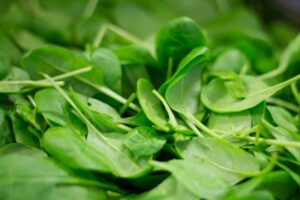Season: Although available year-round in California, it is naturally a cool-weather crop, which means that fall and spring are its peak seasons. It cannot tolerate extreme cold or heat.
Flavor: Raw spinach has a slightly sweet, mild, herb-like, grassy flavor that blends well into any salad or sandwich. Cooked spinach becomes tangy and slightly acidic in flavor, which most people try to mask with garlic.
Storage: Those tender leaves are vulnerable to decay. Unlike chard, kale and other green leafy friends, baby spinach will keep, at the most, for a few days in the refrigerator crisper. Moisture is a villain, so dump accumulating water from produce bags and keep it unwashed until ready to use. Pre-washed spinach in bags and containers will keep for up to a week, but that’s no reason to get complacent, check often for moisture build-up.
How to use: For salads and other raw preparations, flat-leaf spinach, or young “baby” spinach, is the perfect base.
When cooking, do you boil, or not? There are varying schools of thought on the matter. Many cookbook authors recommend transferring just-washed spinach to a saucepan, using just the residual water that clings to the spinach leaves for a quick wilt. The argument is that fewer soluble vitamins are lost compared to spinach cooked in rapidly boiling water. But others argue that boiling helps reduce the amount of oxalic acid, which can interfere with calcium and iron absorption. After you’ve cooked it, drain the spinach, then place in a skillet with a smidge of your favorite fat — anchovies, bacon, coconut oil, chopped walnuts — for an instant layer of flavor.
But remember, spinach is more than 90 percent water and shrinks like crazy when you cook it!
Nutrition: In the nutrient department, spinach has got it all. One cup of cooked spinach contains four grams of fiber and more than five grams of protein, all clocking in at 41 calories. It is exceptionally rich in Vitamins A and K, and delivers big time in calcium, potassium, Vitamins B-2 and B-6, Vitamin C and iron. It even has those heart-healthy omega-3 fatty acids, plus a respectable serving of choline, a B vitamin that supports the nervous system and snuffs out inflammation. It’s also loaded with disease-fighting phytonutrients called carotenoids that are being studied for their links to cancer prevention.
The caveats: Oxalates, which may be an issue for people with kidney or gall bladder conditions; and purines, which can contribute to excess buildup of uric acid, a potential issue with anyone suffering from gout. In addition, the amount of oxalic acid in spinach is enough to interfere with the calcium benefits from spinach. Consult your medical provider for further details.


